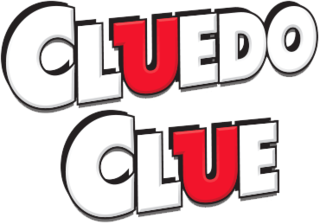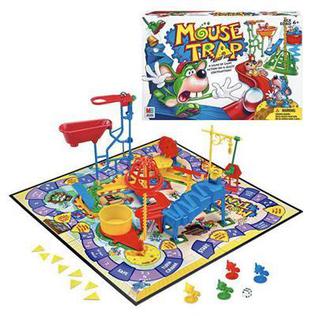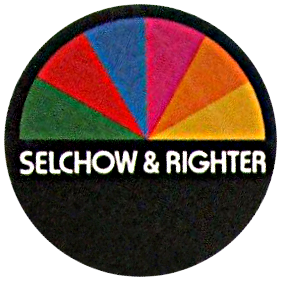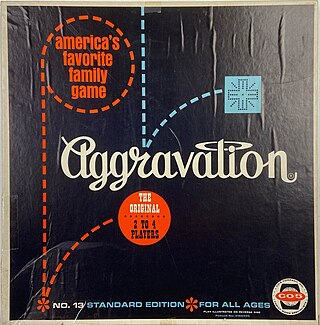
Ludo is a strategy board game for two to four players, in which the players race their four tokens from start to finish according to the rolls of a single die. Like other cross and circle games, Ludo is derived from the Indian game Pachisi. The game and its variations are popular in many countries and under various names.

Cluedo, known as Clue in North America, is a murder mystery game for three to six players that was devised in 1943 by British board game designer Anthony E. Pratt. The game was first manufactured by Waddingtons in the United Kingdom in 1949. Since then, it has been relaunched and updated several times, and it is currently owned and published by the American game and toy company Hasbro.

Trouble is a board game in which players compete to be the first to send four pieces all the way around a board. It is based on a traditional game called "Frustration" played on a wooden board with indentations for marble playing pieces and rules similar to Parcheesi. Pieces are moved according to the roll of a die using a contained device called a "Pop-O-Matic".

Parker Brothers was an American toy and game manufacturer which in 1991 became a brand of Hasbro. More than 1,800 games were published under the Parker Brothers name since 1883. Among its products were Monopoly, Clue, Sorry!, Risk, Trivial Pursuit, Ouija, Aggravation, Bop It, Scrabble, and Probe. The trade name became defunct with former products being marketed under the "Hasbro Gaming" label with the logo shown on Monopoly games.

Battleship is a strategy type guessing game for two players. It is played on ruled grids on which each player's fleet of warships are marked. The locations of the fleets are concealed from the other player. Players alternate turns calling "shots" at the other player's ships, and the objective of the game is to destroy the opposing player's fleet.

Parcheesi is a brand-name American adaptation of the Indian cross and circle board game Pachisi, published by Selchow & Righter and Winning Moves Games USA.

Sorry! is a board game that is based on the ancient Indian cross and circle game Pachisi. Players move their three or four pieces around the board, attempting to get all of their pieces "home" before any other player. Originally manufactured by W.H. Storey & Co in England and now by Hasbro, Sorry! is marketed for two to four players, ages 6 and up. The game title comes from the many ways in which a player can negate the progress of another, while issuing an apologetic "Sorry!"

Connect Four is a game in which the players choose a color and then take turns dropping colored tokens into a six-row, seven-column vertically suspended grid. The pieces fall straight down, occupying the lowest available space within the column. The objective of the game is to be the first to form a horizontal, vertical, or diagonal line of four of one's own tokens. It is therefore a type of M,n,k-game with restricted piece placement. Connect Four is a solved game. The first player can always win by playing the right moves.
In video game parlance, a multicart is a cartridge that contains more than one game. Typically, the separate games are available individually for purchase or were previously available individually. For this reason, collections, anthologies, and compilations are considered multicarts. The desirability of the multicart to consumers is that it provides better value, greater convenience, and more portability than the separate games would provide. The advantage to developers is that it allows two or more smaller games to be sold together for the price of one larger game, and provides an opportunity to repackage and sell older games one more time, often with little or no changes.

Mouse Trap is a board game first published by Ideal in 1963 for two to four players. It is one of the first mass-produced three-dimensional board games. Players at first cooperate to build a working mouse trap in the style of a Rube Goldberg machine. Then, players turn against each other to trap opponents' mouse-shaped game pieces.

Mensch ärgere Dich nicht is a German board game, developed by Josef Friedrich Schmidt in 1907/1908. Some 70 million copies have been sold since its introduction in 1914 and it is played in many European countries.

Perfection is a game originally produced by the Pennsylvania company Reed Toys and then by the Milton Bradley company. The object is to put all the pieces into matching holes on the board before the time limit runs out. When time runs out, the board springs up, causing many, if not all, of the pieces to fly out. In the most common version, there are 25 pieces to be placed into a 5×5 grid within 60 seconds.

Selchow and Righter was a 19th- and 20th-century game manufacturer best known for the games Parcheesi and Scrabble. It was based in Bay Shore, New York.

Aggravation is a board game for up to four players and later versions for up to six players, whose object is to be the first player to have all four playing pieces reach the player's home section of the board. The game's name comes from the action of capturing an opponent's piece by landing on its space, which is known as "aggravating". The name was coined by one of the creators, Louis Elaine, who did not always enjoy defeat.
Hasbro Family Game Night is a series of video games that adapt board games manufactured by Hasbro.
Cluedo, known as Clue in North America, is a murder mystery-themed multimedia franchise started in 1949 with the manufacture of the Cluedo board game. The franchise has since expanded to film, television game shows, book series, computer games, board game spinoffs, a comic, a play, a musical, jigsaws, card games, and other media.













